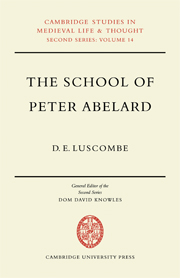Book contents
- Frontmatter
- Contents
- Preface
- List of Abbreviations
- I The Literary Evidence
- II Abelard's Followers
- III The Diffusion of Abelardian Writings
- IV The Condemnation of 1140
- V The Theological Writings of Abelard's Closest Disciples
- VI The School of Laon
- VII Hugh of St Victor
- VIII The Summa Sententiarum
- IX Abelard and the Decretum of Gratian
- X Abelard's Disciples and the School of St Victor
- XI Peter Lombard
- XII Robert of Melun
- XIII Richard of St Victor
- XIV Conclusion
- Appendices
- Bibliography
- Index of Manuscripts
- General Index
I - The Literary Evidence
Published online by Cambridge University Press: 05 November 2011
- Frontmatter
- Contents
- Preface
- List of Abbreviations
- I The Literary Evidence
- II Abelard's Followers
- III The Diffusion of Abelardian Writings
- IV The Condemnation of 1140
- V The Theological Writings of Abelard's Closest Disciples
- VI The School of Laon
- VII Hugh of St Victor
- VIII The Summa Sententiarum
- IX Abelard and the Decretum of Gratian
- X Abelard's Disciples and the School of St Victor
- XI Peter Lombard
- XII Robert of Melun
- XIII Richard of St Victor
- XIV Conclusion
- Appendices
- Bibliography
- Index of Manuscripts
- General Index
Summary
Joseph de Ghellinck once observed that Abelard was perhaps the only medieval master whose contemporaries recorded his fame so universally and with such enthusiasm and horror. From this rich crop of literary witnesses the ways in which Abelard impressed his contemporaries and their successors can be known. The most emphatic testimony to Abelard's fame was provided, however, by Abelard himself. In his fifties, c. 1133–6, Abelard wrote in the form of a letter to a friend his own apologia. In this traditionally entitled History of My Troubles Abelard made plain that he enjoyed to a remarkable degree the gift of attracting large numbers of followers; wherever he taught he gained crowds of admiring students. Abelard also recorded that his writings enjoyed a similar popularity. In 1139 his opponent Bernard of Clairvaux complained that these writings had taken wing and had flown into many cities and castles and even into other lands. Bernard tells us too of Abelard's boast that his works had been spread in Rome.
Abelard's friends lauded his fame with enthusiasm. Heéloïse wrote that such celebrity had never been enjoyed by any king or philosopher. Whole districts and towns would be excited at his coming. Fulk, prior of the Benedictine house of St Eugeéne at Deuil in the valley of Montmorency, wrote in a letter of consolation after Abelard's mutilation and before 1118 that his school counted among its members Romans, Englishmen, Germans, Swedes and natives from every part of France. The dangers of travel meant nothing to them for they believed that Abelard could teach them everything.
- Type
- Chapter
- Information
- The School of Peter AbelardThe Influence of Abelard's Thought in the Early Scholastic Period, pp. 1 - 13Publisher: Cambridge University PressPrint publication year: 1969



